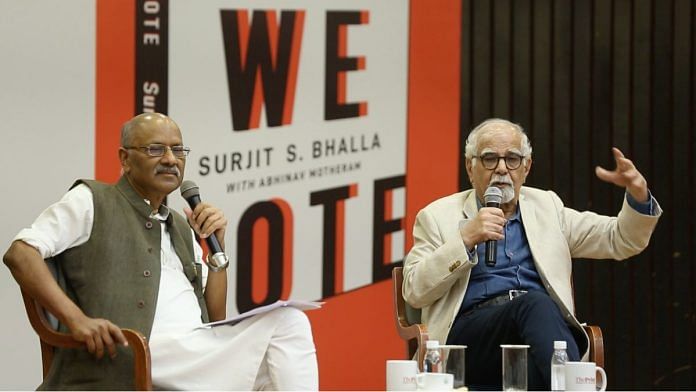New Delhi: Noted economist and author Surjit Bhalla has predicted that the BJP will win 330 seats this Lok Sabha election, while the Congress’s fortunes may dip two percentage points from 2019.
He based his prognosis on the trend set by state polls between national elections.
In the latest episode of ThePrint’s Off the Cuff, Bhalla said the BJP’s average vote gain in assembly elections after 2019 has been around 5 percent.
“So we say, look, we have a base case of 5 percent. So, if their vote share increases by about five percentage points, they will get 330 seats,” he told ThePrint Editor-in-Chief Shekhar Gupta.
The former IMF executive director considers state polls as a key weather vane because voters have “already expressed their feelings in the political marketplace”.
Things are, however, not looking good for the Congress, according to the economist. Past trends showed, he said, that the Congress has lost two percentage points every five years in national elections from 1952 to 2019.
This is what he called a “very, very strong time trend”. On the contrary, from 1984 onwards, the BJP’s vote share gained by about three percentage points every five years, he said.
‘Only economic welfare matters’
Not caste or inflation, but economic welfare was the most dominant factor that influenced Indians when they voted, said the economist.
Launching his new book, How We Vote, Bhalla said factors like nationalism and caste did matter in polls, but their impact was nowhere close to the commanding role played by economic welfare.
To buttress his point, Bhalla said if any incumbent government in the past has delivered growth in per capita income at more than 3.25 percent or less, “just that factor alone explains the results of 10 of the last 14 elections”.
He said inflation was also not as important to voters though opposition parties continue to raise the issue. “All surveys say that people are worried about price rise no matter what the inflation rate is but inflation plays a zilch role in explaining voting behaviour,” Bhalla added.
Inequality down for 1st time
The economist said he has also noticed a “first of its kind” trend this time. According to available data, over the last 5 years, there has been a decline in inequality in India, which is for the first time ever. “And for most of the countries, you never ever see a decline in inequality,” Bhalla added.
He believes one of the major reasons for this was the “efficient targeting of incomes for the poor”.
“It’s very important to remember what Rajiv Gandhi said in 1985, that only 16 percent of the money meant for the poor actually reached the poor. So here we have this government doing this very efficiently, in spades. Now, the targeting of the food subsidies is something close to 90 percent,” the author pointed out. “That is, 90 percent of the people who should be getting the free food are getting the free food.”
Bhalla, however, said it was time for the next government to rethink food subsidies. “It’s much better to decrease the number of people since we can now target it so well. You should really have it for the bottom third of the population and give them more money,” he concluded.
(Edited by Tikli Basu)

Also read: Whose economic performance was better, UPA or NDA? Growth rates don’t tell the whole story



